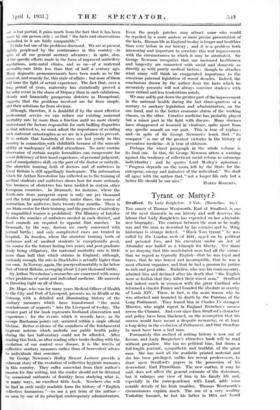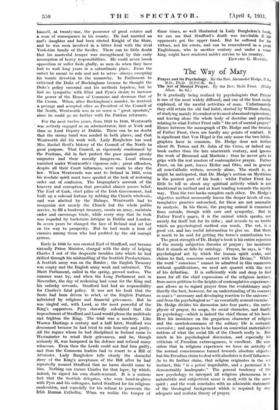Tyrant or Martyr ?
Strafford. By Lady Burghelere. 2 Vols. (Macmillan. 30s.) THE career of Thomas Wentworth, Earl of Strafford. is one of the most dramatic in our history and well deserves the labour that Lady Burghclere has expended on her admirable new biography. The contrast between the man as lie really was and the man as described by his enemies and by Whig historians is strange indeed. " Black Tom tyrant " he was called by the London mob of 1641, egged on by political and personal foes, and his execution under an Act of Attainder was hailed as a triumph for liberty. Yet there is no denying that this much-hated man had all the virtues that we regard as typically English—that he was loyal and brave, that he was honest and incorruptible, that he was a most efficient organizer, and that he had a passion for justice to rich and poor alike. Richelieu, who was his contemporary, admired him and declared after his death that " the English were so foolish that they killed their wisest man." Strafford had indeed much in common with the great Cardinal who reformed a chaotic France and founded the absolute monarchy of Louis XIV. There, in fact, is the main reason why he was attacked and hounded to death by the Puritans of the Long Parliament. They feared him as Charles I's strongest Minister, who might repeat in England Richelieu's success across the Channel. And ever since then Strafford's character and policy have been blackened, on the assumption that his success would have meant a despotic monarchy, or at least a long delay in the evolution of Parliament, and that therefore he must have been a bad man.
Fortunately this method of writing history is now out of favour, and Lady Burghclere's attractive book will be read without prejudice. She has no political bias, but draws a full-length portrait, sympathetic and truthful, of the great man. She has used all the available printed material and she has been privileged, unlike her recent predecessors, to draw upon Strafford's papers in the possession of his descendant, Earl Fitzwilliam. The new matter, it may be said, does not affect the general estimate of the statesman, but it enlarges our view of him in his family life and, especially in the correspondence with Laud, adds some notable details of his Irish troubles. Thomas Wentworth's circumstances explain much. The son of a very wealthy Yorkshire baronet, he lost his father in 1614 and found
himself, at twenty-one, the possessor of great estates and a man of consequence in his county. He had married an earl's daughter and had been elected Knight of the Shire, and he was soon involved in a bitter feud with the rival Yorkshire family of the Saviles. There can be little doubt that his masterful temper was strengthened by this early assumption of heavy responsibilities. He could never brook opposition or suffer fools gladly, as men do when they have bad to wait long years in a subordinate place. From the outset he meant to rule and not to serve—always excepting his innate devotion to the monarchy. In Parliament he criticized the Duke of Buckingham because he thought the Duke's policy unsound and his methods hopeless, but he had no sympathy with Eliot and Pym's desire to increase the power of the House of Commons and decrease that of the Crown. When, after Buckingham's murder, he received a peerage and accepted office as President of the Council of the North, Wentworth was in no sense a " great apostate," since he could go no further with the Puritan reformers.
For the next twelve years, from 1628 to 1640, Wentworth was actively engaged as an administrator, first at York and then as Lord Deputy at Dublin. There can be no doubt that the strong hand was needed in both places, and that Wentworth did his work well. Lady Burghclere has used Miss Rachel Reid's history of the Council of the North to good purpose. That Council, so vigorously condemned by the Puritans, did in fact protect the poor against greedy magnates and their rascally hangers-on. Local abuses vanished under Wentworth's vigorous rule ; great offenders, despite all their Court influences, were made to obey the law. When Wentworth was sent to Ireland in 1633, even his resolute spirit must have quailed at the task of restoring order out of confusion. The biographer's account of the knavery and corruption that prevailed almost passes belief. The Earl of Cork, chief pillar of the Irish Government, had built up a colossal fortune by robbing the Church wholesale, and _was abetted by the Bishops. Wentworth had to reorganize not merely the Church but the whole public service, to fill a bankrupt treasury, create an army, maintain order and encourage trade, while every step that he took was impeded by backstairs intrigue in Dublin and London. In seven years he changed the face of Ireland and set her on the way to prosperity. But he had made a host of enemies among those who had profited by the old corrupt system.
Early in 1640 he was created Earl of Strafford, and became virtually Prime Minister, charged with the duty of helping Charles I out of the desperate troubles into which he had drifted through his mishandling of the Scottish Presbyterians. A Scottish army was on the Border ; the English Treasury was empty and the English army weak and untrained. The Short Parliament, called in the spring, proved useless. The summer went by, and when the Long Parliament met in November, the day of reckoning had come for the King and his unlucky servants. Strafford had had no responsibility for Charles's fatal policy. It was not his fault that the Scots had been driven to rebel, or the English Puritans infuriated by religious and financial grievances. But he was singled out, with Laud, as the most powerful of the King's supporters. Pym shrewdly calculated that the impeachment of Strafford and Laud would please the multitude and frighten the King. The trial was a mockery. Like Warren Hastings a century and a half later, Strafford was denounced because he had tried to rule honestly and justly. All the rogues whom he had disciplined in Ireland came to Westminster to retail their grievances, and he, though seriously ill, was hampered in his defence and refused many witnesses. Even then the Lords could not find him guilty, and thus the Commons leaders had to resort to a Bill of Attainder. Lady Burghclere tells clearly the shaineful story of the King's acceptance of the Bill after he had repeatedly assured 'Strafford that no harm should come to him. Nothing can excuse Charles for that lapse, by which, indeed, he signed his own death-warrant. It is a curious fact that the Scottish delegates, who were hand-in-glove with Lynn and his colleagues, hated Strafford for his religious moderation, and especially for his. refusal., to persecute the Irish Roman Catholics, When we realike the temper of those times, so well illustrated in Lady Burghclere's book, we can see that Strafford's death was inevitable if his opponents got the upper hand. But he suffered for his virtues, not his errors, and can be remembered as a great Englishman, who in another century and under a wiser king, might have rendered nobler service to his country.
EDWARD G. HAWKE.









































 Previous page
Previous page